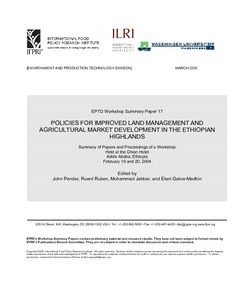Resource information
“The objectives of this workshop are to review and discuss the main findings and policy implications of recent research conducted on these topics by IFPRI, Wageningen University and Research Center (WUR), the International Livestock Research Institute (ILRI), Mekelle University (MU), the Ethiopian Agricultural Research Organization (EARO) and other Ethiopian collaborators; to discuss options for improving the development of agricultural markets and land management in Ethiopia, considering different stakeholders’ perspectives; and to develop recommendations for priority policy actions and further research based upon lessons learned from the research and remaining knowledge gaps.
IFPRI has worked for more than a decade in Ethiopia studying the root causes of the interrelated problems of famine, rural poverty, low agricultural productivity and natural resource degradation, and helping to identify strategies and policies to overcome these problems. The need for effective and efficient markets for agricultural commodities and productive inputs, as well as effective measures to combat land degradation are clearly recognized by the government of Ethiopia in its current rural development strategy and poverty reduction strategy. Ethiopia has made great strides in recent years in increasing farmers’ access to productive technologies. Yet as we are all increasingly aware, these advances are necessary but not sufficient to achieve the goal of agriculturally led industrialization. Market development and sustainable natural resource management are essential building blocks of a successful rural development strategy, requiring policy makers and other stakeholders to identify and invest in an appropriate mix of institutions, infrastructure, information, and innovation systems.
This workshop is intended to help contribute to these important efforts by taking stock of what is known and what we have learned from several years of recent research on sustainable land management and agricultural market development.



